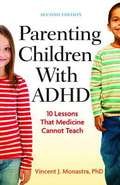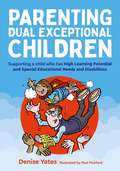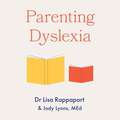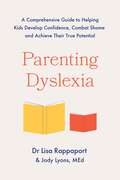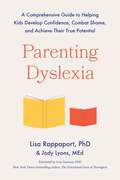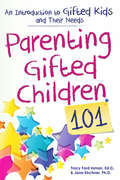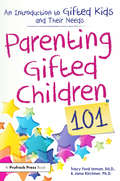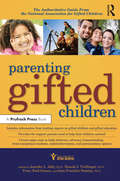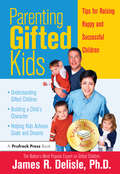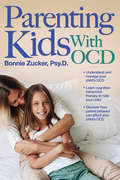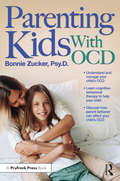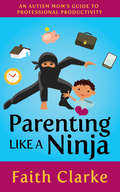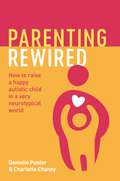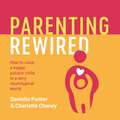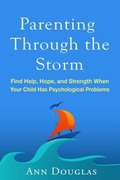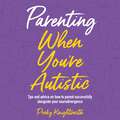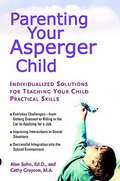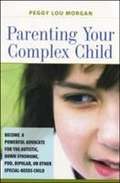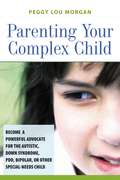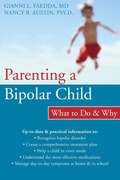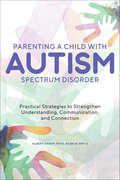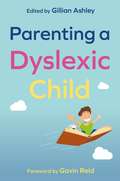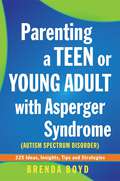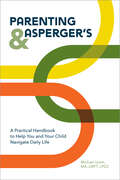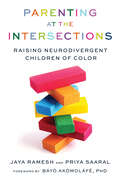- Table View
- List View
Parenting Children with ADHD: 10 Lessons that Medicine Cannot Teach (Second Edition)
by Vincent J. MonastraIn this second edition of Parenting Children With ADHD, Dr. Vince Monastra provides practical, step-by-step guidance to parents looking for ways to bring out the best in kids with ADHD. He presents updated lessons about the causes of ADHD, how medications work, and the problems that sleep deficits, poor nutrition, and other medical disorders can cause. He also shares his innovative approach for improving organization, task-completion, problem-solving and emotional control.
Parenting Dual Exceptional Children: Supporting a Child who Has High Learning Potential and Special Educational Needs and Disabilities
by Denise YatesThis is the first comprehensive guide for parents of children with Dual and Multiple Exceptionality (DME, sometimes called Twice Exceptionality or 2E). Children with high learning potential may also have conditions such as ASD, ADHD, dyslexia and dyspraxia, having 'flashes of brilliance' in some areas whilst needing additional support in others. As a result, their abilities may not always be recognised in an educational setting.This book takes a strengths-based approach towards helping parents recognise and focus on their child's areas of potential to support them towards better attainment and self-esteem, and build on these abilities while also identifying and addressing areas of difficulty. It provides an understanding of the mixed learning profile of DME children, explaining why they excel in some areas but not others, as well as guidance for parents on working positively with schools and providing their child with the support they need.With stories, quotes from parents and examples throughout, this is an essential guide to helping DME children achieve their full untapped potential.
Parenting Dyslexia: A Comprehensive Guide to Helping Kids Combat Shame, Build Confidence and Achieve Their True Potential
by Jody Lyons Dr Lisa RappaportFifteen million children in the United States have been diagnosed with dyslexia. This learning disability is a major challenge not only for the kids, but also for their parents, families, teachers, tutors, and therapists. And yet, dyslexia doesn't have to be a disadvantage for kids - if the right tools are available. Parenting Dyslexia fills this critical need, providing prescriptive advice and concrete tips to drive educational and personal growth without any associated stigma. An easy-to-use, comprehensive reference book for anyone caring for adyslexic child to use at all stages of development, Parenting Dyslexia effectively anticipates and addresses the psychosocial and academic issues that dyslexic learners are likely to face at different stages, including:* Cultivating varied skills to balance out classic deficits.* Developing effective self-esteem and academic habits to help overcome age-specific hurdles.* Establishing individual and family practices to prevent a child's feelings of isolation, anxiety, and depression.* Survival tools to navigate the predictable challenges a dyslexic learner will likely encounter.* Nurturing independence as well as a child's ability to ask for help and become a strong self-advocate.The book provides an accessible roadmap of how to:* Move through the major hurdles of dyslexia.* Reassure children that not only can they survive dyslexia, but they can thrive using sound psychosocial and academic practices.* Avoid typical pitfalls of a well-intentioned campaign to push a child to succeed that can lead to frustration and resistance.* Unite family members to be part of the family 'team' to supply special support for their dyslexic learner.* Create an atmosphere of fun and humor to help everybody maintain perspective during stressful moments.Dr. Rappaport is not only an authority on the subject, but she also happens to be dyslexic herself. From her unique vantage point, she provides a relatable, sympathetic, and optimistic voice of personal experience to this sensitive topic. Grounded in science but written in non-technical language, Parenting Dyslexia offers a wealth of tried-and-true methods for supporting dyslexic learners of all ages.
Parenting Dyslexia: A Comprehensive Guide to Helping Kids Combat Shame, Build Confidence and Achieve Their True Potential
by Jody Lyons Dr Lisa RappaportFifteen million children in the United States have been diagnosed with dyslexia. This learning disability is a major challenge not only for the kids, but also for their parents, families, teachers, tutors, and therapists. And yet, dyslexia doesn't have to be a disadvantage for kids - if the right tools are available. Parenting Dyslexia fills this critical need, providing prescriptive advice and concrete tips to drive educational and personal growth without any associated stigma. An easy-to-use, comprehensive reference book for anyone caring for adyslexic child to use at all stages of development, Parenting Dyslexia effectively anticipates and addresses the psychosocial and academic issues that dyslexic learners are likely to face at different stages, including:* Cultivating varied skills to balance out classic deficits.* Developing effective self-esteem and academic habits to help overcome age-specific hurdles.* Establishing individual and family practices to prevent a child's feelings of isolation, anxiety, and depression.* Survival tools to navigate the predictable challenges a dyslexic learner will likely encounter.* Nurturing independence as well as a child's ability to ask for help and become a strong self-advocate.The book provides an accessible roadmap of how to:* Move through the major hurdles of dyslexia.* Reassure children that not only can they survive dyslexia, but they can thrive using sound psychosocial and academic practices.* Avoid typical pitfalls of a well-intentioned campaign to push a child to succeed that can lead to frustration and resistance.* Unite family members to be part of the family 'team' to supply special support for their dyslexic learner.* Create an atmosphere of fun and humor to help everybody maintain perspective during stressful moments.Dr. Rappaport is not only an authority on the subject, but she also happens to be dyslexic herself. From her unique vantage point, she provides a relatable, sympathetic, and optimistic voice of personal experience to this sensitive topic. Grounded in science but written in non-technical language, Parenting Dyslexia offers a wealth of tried-and-true methods for supporting dyslexic learners of all ages.
Parenting Dyslexia: A Comprehensive Guide to Helping Kids Develop Confidence, Combat Shame, and Achieve Their True Potential
by Jody Lyons Lisa RappaportLicensed psychologist and authority on dyslexia (who is also dyslexic herself) Lisa Rappaport offers a practical guide to help parents and others support dyslexic learners throughout their school years and beyond. It is estimated that fifteen million children in the United States are dyslexic which can often be a major challenge not only for the kids, but also for their parents, families, teachers, tutors, and therapists. Dyslexia doesn't have to be a disadvantage for kids, if the right tools are available. Parenting Dyslexia provides prescriptive advice and concrete tips to drive educational and personal growth without any associated stigma. An easy-to-use, comprehensive reference book for anyone caring for a dyslexic child to use at all stages of development, Parenting Dyslexia addresses the psychosocial and academic issues that dyslexic learners are likely to face at different stages, including: ·Cultivating varied skills to balance out classic deficits. ·Developing effective self-esteem and academic habits to help overcome age-specific hurdles. ·Establishing individual and family practices to prevent a child's feelings of isolation, anxiety, and depression. ·Survival tools to navigate the predictable challenges a dyslexic learner will likely encounter. ·Nurturing independence as well as a child&’s ability to ask for help and become a strong self-advocate. From her unique vantage point, Dr. Rappaport provides a relatable, sympathetic, and optimistic voice of personal experience to this sensitive topic. Grounded in science but written in non-technical language, Parenting Dyslexia offers a wealth of tried-and-true methods for supporting dyslexic learners of all ages.
Parenting Gifted Children 101: An Introduction to Gifted Kids and Their Needs
by Tracy Inman Jana KirchnerThis practical, easy-to-read book explores the basics of parenting gifted children, truly giving parents the "introductory course" they need to better understand and help their gifted child. Topics include myths about gifted children, characteristics of the gifted, the hows and whys of advocacy, social and emotional issues and needs, strategies for partnering with your child's school, and more. Parenting Gifted Children 101 explores ways for you to help your child at home and maximize your child's educational experience with strategies that are based on research, but easy to implement. Each chapter--from parenting twice-exceptional students to navigating the possible challenges that school may hold for your child--contains resources for further reading and insights from more than 50 parents and educators of gifted children.
Parenting Gifted Children 101: An Introduction to Gifted Kids and Their Needs
by Tracy Ford Inman Jana KirchnerThis practical, easy-to-read book explores the basics of parenting gifted children, truly giving parents the "introductory course" they need to better understand and help their gifted child. Topics include myths about gifted children, characteristics of the gifted, the hows and whys of advocacy, social and emotional issues and needs, strategies for partnering with your child's school, and more. Parenting Gifted Children 101 explores ways for you to help your child at home and maximize your child's educational experience with strategies that are based on research, but easy to implement. Each chapter—from parenting twice-exceptional students to navigating the possible challenges that school may hold for your child—contains resources for further reading and insights from more than 50 parents and educators of gifted children.Texas Association for the Gifted and Talented 2017 Legacy Book Award Winner - Parenting
Parenting Gifted Children: The Authoritative Guide From the National Association for Gifted Children
by Jennifer L. Jolly Donald J. Treffinger Tracy Ford InmanWhen parents need the most authoritative information on raising gifted kids, they can turn to Parenting Gifted Children: The Authoritative Guide From the National Association for Gifted Children, a gifted education Legacy Award winner. This comprehensive guide covers topics such as working with high achievers and young gifted children, acceleration, advocating for talented students, serving as role models and mentors for gifted kids, homeschooling, underachievement, twice-exceptional students, and postsecondary opportunities.The only book of its kind, this guidebook will allow parents to find the support and resources they need to help their children find success in school and beyond. Written by experts in the field of gifted education and sponsored by the leading organization supporting the education of gifted and advanced learners, this book is sure to provide guidance, advice, and support for any parent of gifted children.Texas Association for the Gifted and Talented 2011 Legacy Book Award Winner - Parenting
Parenting Gifted Kids: Tips for Raising Happy and Successful Children
by James DelisleA gifted education Legacy Award winner, Parenting Gifted Kids: Tips for Raising Happy and Successful Children provides a humorous, engaging, and encouraging look at raising gifted children today. James R. Delisle, Ph.D., offers practical, down-to-earth advice that will cause parents to reexamine the ways they perceive and relate to their children.Dr. Delisle puts forward 10 tips to parents of gifted children—ideas that reflect attitude and approach and allow for introspection and change, rather than quick, do-it-tonight solutions. Some topics of interest include understanding a child's giftedness, working with the school system, dealing with perfectionism in gifted kids, and being adult role models for children. Along the way, stories from gifted children and their parents provide insight into the lives of these individuals.What sets this book apart from other books for parents of gifted kids is its expansion beyond mere platitudes. Dr. Delisle's tips go beyond the basics, focusing on attitude, reflection, and subtle changes, rather than specific, cookie-cutter recipes for action. The 10 tips suggested and expanded upon in this book include: understanding what giftedness is . . . and what it is not; understanding the differences between gifted kids and their agemates; understanding the personality traits of gifted kids, including overexcitabilities; taking charge of your child's education; understanding the issue of perfectionism in gifted kids; examining social nuances and myths related to giftedness; examining the similarities parents share with their gifted children; setting reasonable goals; helping gifted children make a difference in the lives of others; and remembering that gifted children are kids first and gifted second.Educational Resource
Parenting Kids With OCD: A Guide to Understanding and Supporting Your Child With OCD
by Bonnie ZuckerParenting Kids With OCD provides parents with a comprehensive understanding of obsessive-compulsive disorder, its symptoms, types, and presentation in children and teens. The treatment of OCD is explained, and guidelines on how to both find appropriate help and best support one's child is provided. Family accommodation is the rule, not the exception, when it comes to childhood OCD; yet, higher accommodating is associated with a worsening of the child's symptoms and greater levels of familial stress. Parents who have awareness of how they can positively or negatively impact their child's OCD can benefit their child's outcome. Case examples are included to illustrate the child's experience with OCD and what effective treatment looks like. OCD worsens when there is increased stress for the child; therefore, stress management is an essential component for improvement. Parents will learn how to manage stress in themselves and encourage effective stress management for their children.
Parenting Kids With OCD: A Guide to Understanding and Supporting Your Child With OCD
by Bonnie ZuckerParenting Kids With OCD provides parents with a comprehensive understanding of obsessive-compulsive disorder, its symptoms, types, and presentation in children and teens. The treatment of OCD is explained, and guidelines on how to both find appropriate help and best support one's child are provided. Family accommodation is the rule, not the exception, when it comes to childhood OCD; yet, higher accommodating is associated with a worsening of the child's symptoms and greater levels of familial stress. Parents who have awareness of how they can positively or negatively impact their child's OCD can benefit their child's outcome. Case examples are included to illustrate the child's experience with OCD and what effective treatment looks like. OCD worsens when there is increased stress for the child; therefore, stress management is an essential component for improvement. Parents will learn how to manage stress in themselves and encourage effective stress management for their children.
Parenting Like a Ninja: An Autism Mom’s Guide to Professional Productivity
by Faith ClarkeParenting Like a Ninja is an authentic discussion of the complexity faced by working autism moms, with clear steps to increase energy and productivity in all areas of work and life. As a mommy of a child with autism, the daily reality of food wars, tantrums, a steady variety of body fluids, erratic non-sleep, and the revolving door of therapists is just exhausting. Autism moms keep it together, but sometimes, they just want the relentless pace of chaotic activity to stop so they can figure out the rest of their life, move ahead with their professional dreams, and just be more productive. In Parenting Like a Ninja, Faith Clarke walks moms through well-established principles of psychological well-being and thriving to create balance and energize their professional productivity, so they can build more of what they have been looking for professionally, all while being able to nurture their child’s well-being.
Parenting Rewired: How to Raise a Happy Autistic Child in a Very Neurotypical World
by Danielle Punter Charlotte ChaneyParenting an autistic child as a neurotypical adult can be challenging but it doesn't need to feel impossible! This essential guide will help you reshape your approaches to parenting.Packed with lived-experience insight and easy-to-follow advice this transformative guide will change how you view the behaviour of your autistic child and challenge you to rewire your thinking to see the world through the autistic lens. This guide challenges the common misunderstandings surrounding autistic behaviour, such as emotional dysregulation in public settings or meltdowns at mealtimes. Parents and carers will be given a deeper understanding of why your child behaves the way they do and how a change in your parenting approach is key to relax and resolve difficult situations. This book gives you all the tools you need to not only parent your autistic child, but also to understand them.With tips on how to support and interpret emotional dysregulation, meltdowns, food aversions and much more, you will learn how to see the world through your child's eyes, using communication techniques that will help you and your child thrive.
Parenting Rewired: How to Raise a Happy Autistic Child in a Very Neurotypical World
by Danielle Punter Charlotte ChaneyTwo neurodiverse parents share easy-to-follow advice on how to adapt your parenting style to meet the needs of an autistic child.Parenting an autistic child as a neurotypical adult can be challenging but it doesn't need to feel impossible! This essential guide will help you reshape your approaches to parenting.Packed with lived-experience insight and easy-to-follow advice this transformative guide will change how you view the behaviour of your autistic child and challenge you to rewire your thinking to see the world through the autistic lens. This guide challenges the common misunderstandings surrounding autistic behaviour, such as emotional dysregulation in public settings or meltdowns at mealtimes. Parents and carers will be given a deeper understanding of why your child behaves the way they do and how a change in your parenting approach is key to relax and resolve difficult situations. This audiobook gives you all the tools you need to not only parent your autistic child, but also to understand them.With tips on how to support and interpret emotional dysregulation, meltdowns, food aversions and much more, you will learn how to see the world through your child's eyes, using communication techniques that will help you and your child thrive.(P) 2023 Jessica Kingsley Publishers
Parenting Through the Storm: Find Help, Hope, and Strength When Your Child Has Psychological Problems
by Ann DouglasRaising a child or teenager with a psychological condition is a "perfect storm" of stress, sadness, and uncertainty. How can you find the best treatments and help your child overcome emotional, behavioral, and academic challenges--while keeping yourself and your family strong? As a parent, you may feel isolated and alone, but the reality is that a lot of families are in the same boat. Ann Douglas knows firsthand just how daunting it can be. In this compassionate and empowering guide, she combines the vital lessons she has learned with vivid stories from other parents and advice from leading psychologists. Several record-keeping forms can be downloaded and printed for repeated use. The book cuts through the often-confusing clinical jargon and speaks from the heart about what matters most: the well-being of your child.
Parenting When You're Autistic: Tips and advice on how to parent successfully alongside your neurodivergence
by Pooky KnightsmithParenting is hard. It's one of those universal constants, like water being wet or grass being green. And being neurodivergent can add an extra layer of tricky to the whole thing. So what can you do?Speaking from a wealth of experience as both a mental health expert and an autistic parent, Pooky Knightsmith guides you through the joys and challenges of raising children in a neurotypical world. From self-care and special interests to meltdowns and managing conflict, the tips and strategies in this book will help you to build a positive relationship with your child, whether they're neurotypical or neurodivergent, all while looking after your own mental health. Always authentic, always practical, sometimes funny, and never judgemental, this book is an essential read for ADHD and neurodivergent parents (and future parents!) looking for advice from someone who's been there and made it work.
Parenting Your Asperger Child
by Cathy Grayson Alan SohnAsperger's Syndrome is a form of autism--but with the right guidance, these children can go on to live happy, fulfilling lives. In Parenting Your Asperger Child, Dr. Alan Sohn's and Cathy Grayson's groundbreaking Cognitive Social Integration Therapy (CSIT) offers practical solutions that help parents prepare their children for a fulfilling life of social interaction outside the confines of their syndrome, addressing such topics as: - The six characteristics of Asperger's Syndrome - How to identify a child's type of Asperger's--and the best approaches for dealing with it - Understanding how an Asperger's child sees and interprets the world - Replacing inappropriate coping techniques with productive skills - How to survive and learn from a crisis - How school programs can aid in teaching Asperger children - Making changes that last
Parenting Your Complex Child: Become a Powerful Advocate for the Autistic, Down Syndrome, PDD, Bipolar, or Other Special Needs Child
by Peggy Lou MorganMorgan describes ways to parent children with special needs, particularly in communication, adaptation, and communicating with those who can help. She first recounts her experiences with her son, who is multiply disabled, then provides suggestions for working with doctors, tracking day-to-day behavior, schedules and routines, documentation, using service dogs, getting professionals to listen, creating a community, and hiring caregivers. The appendix consists of sample forms and lists. The book is aimed at parents of children with behavior disorders, developmental problems, autism, Down syndrome, bipolar disorder, schizophrenia, ADHD, pervasive development disorder, and others. There is no bibliography. Morgan has worked extensively with special-needs children and their families.
Parenting Your Complex Child: Become a Powerful Advocate for the Autistic, Down Syndrome, PDD, Bipolar, or Other Special-Needs Child
by Peggy MorganBesides the usual parenting challenges, parents of disabled children face added obstacles that can tax the resolve and resources of even the strongest families. Peggy Lou Morgan has developed a powerful system for obtaining dramatically better care for children with one or more serious disabilities. Parenting Your Complex Child reflects the experience and knowledge she has gained through decades of navigating a sea of complex medical, educational, occupational, and social issues while working with disabled clients and with her own son. Morgan's unique tracking and documentation tools let parents adapt to their child's challenges, create routines that support the child's needs, communicate those needs to busy professionals -- and be taken seriously by them. The book also helps parents lay the groundwork for care to continue after they themselves can no longer provide it. Compassionate, practical, and proven, Parenting Your Complex Child helps parents ensure that life-changing decisions are based on the best interests of the child -- and on the best information available.
Parenting a Bipolar Child: What To Do And Why
by Gianni Faedda Nancy AustinTwo preeminent researchers and clinicians specializing in the treatment of child-onset bipolar disorder offer the first and only step-by-step guide for parents, a comprehensive approach to helping a child with bipolar disorder by integrating professional medical treatment with behavior regulation, problem solving, positive reinforcement, and limit setting techniques.
Parenting a Child with Autism Spectrum Disorder: Practical Strategies to Strengthen Understanding, Communication, and Connection
by Albert KnappPractical and compassionate strategies to help your child with autism spectrum disorder thriveGet the guidance you need to meet the challenges of raising an exceptional child. Parenting a Child with Autism Spectrum Disorder offers several approaches to help you effectively and respectfully manage everyday situations.Cut down on stress with practical advice drawn from clinical knowledge. Whether building a personal support network, creating safe environments, or navigating your child's relationship with others, you'll discover a variety of ways to set your child and yourself up for success in Parenting a Child with Autism Spectrum Disorder.Parenting a Child with Autism Spectrum Disorder includes:Easy-to-use advice—Find out how to help your child deal with a variety of situations, including home life, family outings, and educational opportunities.Real-life case studies—Gain insight into the use of this book's strategies with the help of examples drawn from real-life case studies.Advocacy and communication tips—Learn ways to better communicate with your child as well as advocate for their unique needs.Get a helping hand in finding the best ways to support your child with autism spectrum disorder.
Parenting a Dyslexic Child
by Helen Ross Lindsay Peer Pennie Aston Adam Gordon Katrina CochraneDrawing on the expert knowledge and research gathered by the British Dyslexia Association, this is a complete guide to parenting a child with dyslexia. Covering assessment, diagnosis, home and school support, emotional development and more, this empowering book has everything you need to help your child reach their full potential.With accessible guidance on reading, writing, spelling, organisation and study skills, this book will also help you to build self-belief in your child whilst ensuring that you care for yourself along the way. This book provides clear information on how dyslexia affects children and families at all stages of life, with insights on communicating with schools and ensuring the best support in all environments.
Parenting a Teen or Young Adult with Asperger Syndrome (Autism Spectrum Disorder): 325 Ideas, Insights, Tips and Strategies
by Brenda Boyd325 astute and practical ideas, insights, tips and strategies address the complex issues parents face during this crucial period of transition for their child with Asperger Syndrome (Autism Spectrum Disorder). The practical, bite-size suggestions focus on the vital importance of developing and nurturing an open and healthy relationship with your son or daughter. The easy-to-navigate format will suit busy parents wanting to locate advice to suit their particular needs. All the suggestions are designed to foster understanding and acceptance between family members and help the AS young person with common problem areas such as social vulnerability and peer relationships, self-esteem, anxiety and coping with change. This will be an invaluable companion for parents, carers and family members of an adolescent or young adult with AS.
Parenting and Asperger's: A Practical Handbook To Help You and Your Child Navigate Daily Life
by Michael UramEveryday parenting techniques to support kids ages 6 to 16 with Asperger's Raising a child with Asperger's can be both exciting and challenging. This book equips you with the confidence and tools to help them better communicate, understand social cues, and adapt to changes. You'll learn how Asperger's fits into the Autism spectrum, even though it's no longer a formal diagnosis, and find evidence-based strategies you can use at home, school, and beyond to make it easier for kids to succeed. Important first steps—Learn about the process of getting a diagnosis, and explore different methods of therapy, like Applied Behavior Analysis and Cognitive Behavioral Therapy. Helpful and realistic strategies—Find techniques to help kindergarteners and high schoolers alike navigate tasks such as leaving on time, practicing good hygiene, attending special events, and more. Resources for parents—Determine the best ways to advocate for your child at school, connect with other parents in the same situation, and balance your own needs as well as the needs of the rest of your family. Discover actionable, expert advice for helping your child thrive.
Parenting at the Intersections: Raising Neurodivergent Children of Color
by Bayo Akomolafe Jaya Ramesh Priya Saaral"This is an invaluable, nuanced, and deeply needed guide to parenting diverse children as we move, together, toward a future in which all brains and bodies are supported—and belong." —Jessica McCabe, How to ADHDWhat if parenting were an act of social justice? In this part story-telling, part self-inquiry book, authors and therapists Jaya Ramesh and Priya Saaral situate parenting children of color with neurodivergence within the context of various interlocking systems of oppression including settler colonialism, White supremacy, ableism, and capitalism. These intersections engender isolation and loneliness. Using the voices of parents on the front lines and other experts, Parenting at the Intersections offer an invitation to parents to slow down and reflect on their own parenting journeys.When parents can be given space to listen to their own voices, to connect with their children, and find community with others, they can find the most radical ways to disrupt systems of oppression.
